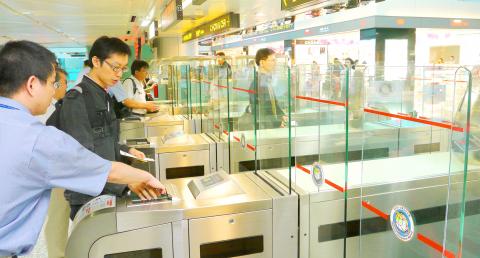The Taipei District Prosecutors’ Office and the Agency Against Corruption have discovered that National Immigration Agency (NIA) officials bought biometric equipment from China for use in the e-Gates in the nation’s three major airports, sources said on Saturday.
The biometric equipment, which has been in use since 2012 at Taiwan Taoyuan International Airport, Kaohsiung International Airport and Taipei International Airport (Songshan airport), allows fast-track passport control for frequent travelers by using biometric verification methods such as facial recognition and fingerprint identification, and might have been compromised by China-made software and equipment, sources told the Liberty Times (the sister paper of the Taipei Times) on condition of anonymity.
The allegation has alarmed government investigators and security experts, who fear the e-Gates would be vulnerable to hacks by China or other groups seeking to obtain privileged information, or to circumvent travel restrictions on criminals or others, sources said.

Photo: Tony Yao, Taipei Times
The Public Construction Commission’s regulations bar the purchase of equipment or technology from China that are “of a sensitive nature or might affect national security.”
Investigators reportedly suspect the bid for e-Gate computers and software was rigged by Transtep Technology Group (跨越科技) owner Lee Chi-shen (李奇申) and then-immigration agency information section chief Shih Ming-te (施明德), sources said.
They said investigators suspect Lee conspired to fix the bid for e-Gate computers and software as early as 2009.
Lee allegedly arranged for other industry figures to submit bids on his behalf and surreptitiously dictated the technical requirements of the project by writing the code for the border control’s operating system, sources said.
While e-Gate contractor Ho Fan Co (和範) is nominally a Fuji Xerox subsidiary, Transtep Technology was in control of all business related to the e-Gate contract, sources said.
TECO Smart Technologies Co (東元捷德), which supplied the e-Gate equipment to Ho Fan, allegedly imported the machines from China and then claimed they had been manufactured in Taiwan, the sources said.
Prosecutors and anti-corruption officials are concerned that Lee appears to have held a monopoly on the government’s procurement of e-Gate systems, they said.
There are fears that Lee might have knowingly or unknowingly compromised the border control apparatus via pre-installed backdoors, which could be exploited by a third party, sources said.
Lee is suspected of having connections to “specific individuals” in China and was known to have sent personnel to Shenzhen for “training,” raising fears that Lee had “nullified” the nation’s border controls and endangered travelers’ privacy, they said.
The sources said Lee and Shih are suspected of involvement in no fewer than seven allegedly rigged tenders over the past eight years and there are concerns the two men might have been acting under the instructions of others.
Shih and former immigration information section chief Chen Ying-chieh (陳英傑) were among the 41 people questioned last month by prosecutors in connection with the suspicious contracts.
Prosecutors in Taipei yesterday would only confirm that an investigation is underway.
Additional reporting by CNA

NATIONAL SECURITY THREAT: An official said that Guan Guan’s comments had gone beyond the threshold of free speech, as she advocated for the destruction of the ROC China-born media influencer Guan Guan’s (關關) residency permit has been revoked for repeatedly posting pro-China content that threatens national security, the National Immigration Agency said yesterday. Guan Guan has said many controversial things in her videos posted to Douyin (抖音), including “the red flag will soon be painted all over Taiwan” and “Taiwan is an inseparable part of China,” while expressing hope for expedited “reunification.” The agency received multiple reports alleging that Guan Guan had advocated for armed reunification last year. After investigating, the agency last month issued a notice requiring her to appear and account for her actions. Guan Guan appeared as required,

A strong cold air mass is expected to arrive tonight, bringing a change in weather and a drop in temperature, the Central Weather Administration (CWA) said. The coldest time would be early on Thursday morning, with temperatures in some areas dipping as low as 8°C, it said. Daytime highs yesterday were 22°C to 24°C in northern and eastern Taiwan, and about 25°C to 28°C in the central and southern regions, it said. However, nighttime lows would dip to about 15°C to 16°C in central and northern Taiwan as well as the northeast, and 17°C to 19°C elsewhere, it said. Tropical Storm Nokaen, currently

‘NATO-PLUS’: ‘Our strategic partners in the Indo-Pacific are facing increasing aggression by the Chinese Communist Party,’ US Representative Rob Wittman said The US House of Representatives on Monday released its version of the Consolidated Appropriations Act, which includes US$1.15 billion to support security cooperation with Taiwan. The omnibus act, covering US$1.2 trillion of spending, allocates US$1 billion for the Taiwan Security Cooperation Initiative, as well as US$150 million for the replacement of defense articles and reimbursement of defense services provided to Taiwan. The fund allocations were based on the US National Defense Authorization Act for fiscal 2026 that was passed by the US Congress last month and authorized up to US$1 billion to the US Defense Security Cooperation Agency in support of the

PAPERS, PLEASE: The gang exploited the high value of the passports, selling them at inflated prices to Chinese buyers, who would treat them as ‘invisibility cloaks’ The Yilan District Court has handed four members of a syndicate prison terms ranging from one year and two months to two years and two months for their involvement in a scheme to purchase Taiwanese passports and resell them abroad at a massive markup. A Chinese human smuggling syndicate purchased Taiwanese passports through local criminal networks, exploiting the passports’ visa-free travel privileges to turn a profit of more than 20 times the original price, the court said. Such criminal organizations enable people to impersonate Taiwanese when entering and exiting Taiwan and other countries, undermining social order and the credibility of the nation’s